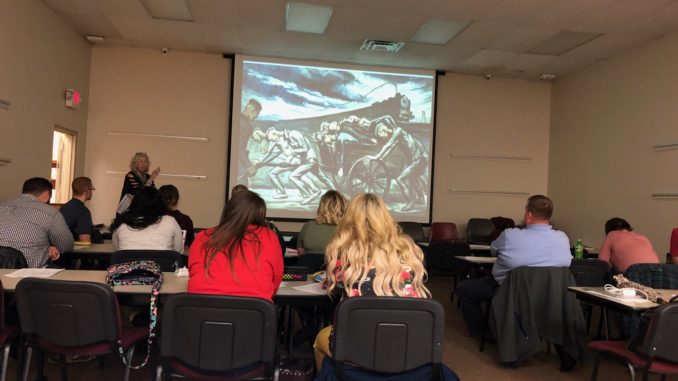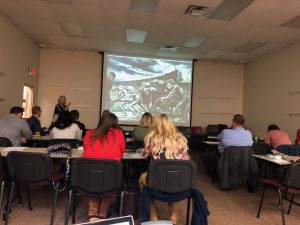
Questions, that was the question and focus of the fourth session of Knox County’s new teacher academy held on Wednesday, November 14.
Brenda Hammons, professional learning coordinator for the Southeast South Central educational cooperative facilitated the session. As Hammons explained, teachers ask students questions for a variety of reasons from stimulating participation, reviewing materials, evoking creativity to personalize what is being taught to something real world that the student is familiar with, among many others. In the session, the goal was to take the questions that teachers ask and turn them into higher order thinking questions.
While teachers can usually spontaneously ask questions to lead discussion, many times the questions assess lower levels of knowledge such as recall and concept. Hammons explained to the new teachers that while research states that no single approach to questioning works best in every classroom, higher order questioning better engages students, pique their curiosity, and spur them to consider new possibilities. Hammons shared different stems that teachers could start questions with that would lead to student analyzing and evaluating before giving an immediate “quick recall” type response.
“Questioning is a huge focus of the school district right now and we thank Mrs. Hammons for sharing best practices with our new teachers,” said Stacy Imel, Director of Next Generation Professionals. Imel explained that for the past two years the district has concentrated on listening to the questions being asked while conducting classroom observations or simply walking through a classroom. “It became apparent that our teachers needed growth in developing their questioning techniques as we recorded what we heard being asked.”
Stems such as Is there a better solution to…, what are the pros and cons of, what data was used to verify, what motive does the character have, and what do you see as other possible outcomes can lead students to make connections, activate prior knowledge, and spark lively class discussion as students share differing responses.
The district plans on offering additional questioning sessions and additional online resources for teachers to use in the near future.
– – –
Resources Online:
https://medicine.wright.edu/sites/medicine.wright.edu/files/page/attachments/QuestionTemplates.pdf
https://www.redhookcentralschools.org/cms/lib/NY01000233/Centricity/Domain/3/Bloom.pdf
https://dataworks-ed.com/blog/2014/10/higher-order-questions/

